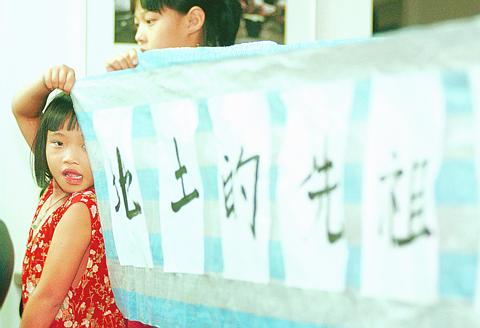A group of Aborigines petitioned the Cabinet's Council of Aboriginal Affairs yesterday for help in recovering land taken by the Ministry of National Defense in 1967.
The 45 petitioners, who include senior citizens, middle-aged people and children, produced evidence documenting that they were the original owners of 77.402 hectares in Hoping township (
"President Chen Shui-bian (陳水扁) has shown his concern for Aboriginal land rights and has committed the government to a policy of returning ancestral lands to Aborigines," the council's chairman, Yohani Isqaqavut (尤哈尼), told the petitioners. "During my term, I will endeavor to see that Aboriginal land rights are respected."

PHOTO: GEORGE TSORNG, TAIPEI TIMES
Chin Su-mei (
The ministry used the land to set up barracks and training camps, Chin said, and it offered "other land as compensation, but they never stuck to the deal."
Another petitioner, Hsu Wan-fu (
"Since the ministry is not using the lands, why not return them to us?" Hsu said. "It's my ancestors' land. I have to take it back."
The defense ministry stopped using some of the land in 1998 and agreed to return it, the petitioners said, but Hoping township officials failed to inform the original owners about meetings with the ministry to discuss transfer of the lands.
The petitioners said township officials located just two of the original owners and returned three plots of land to them. The remaining property was taken over by the township.
The Aborigines asked the council to help them recover 7.402 hectares currently under the township's control, and a 70-hectare plot that is still being used by the defense ministry's Yueh Wu Camp (岳武營區).
In response to the request, Yohani Isqaqavut told the petitioners, "I will continue with my efforts to campaign for land rights and will do so earnestly."
Aboriginal activists, mainly from the Presbyterian Church in Taiwan where Yohani Isqaqavut was once a leader, launched campaigns named "Return Our Lands" in 1989, 1990 and 1992.
The main challenge facing Aborigines is producing documents that show they were the original owners of land.
Mayaw Kumud (
Mayaw Kumud served a one-year jail term in 1995 for breaking laws against assembly and demonstrations during the 1992 "Return Our Land" campaigns.
"Many activists from that time have entered the new government. We won't let go of [the land rights issue] easily," Mayaw Kumud said.

CHAOS: Iranians took to the streets playing celebratory music after reports of Khamenei’s death on Saturday, while mourners also gathered in Tehran yesterday Iranian Supreme Leader Ayatollah Ali Khamenei was killed in a major attack on Iran launched by Israel and the US, throwing the future of the Islamic republic into doubt and raising the risk of regional instability. Iranian state television and the state-run IRNA news agency announced the 86-year-old’s death early yesterday. US President Donald Trump said it gave Iranians their “greatest chance” to “take back” their country. The announcements came after a joint US and Israeli aerial bombardment that targeted Iranian military and governmental sites. Trump said the “heavy and pinpoint bombing” would continue through the week or as long

TRUST: The KMT said it respected the US’ timing and considerations, and hoped it would continue to honor its commitments to helping Taiwan bolster its defenses and deterrence US President Donald Trump is delaying a multibillion-dollar arms sale to Taiwan to ensure his visit to Beijing is successful, a New York Times report said. The weapons sales package has stalled in the US Department of State, the report said, citing US officials it did not identify. The White House has told agencies not to push forward ahead of Trump’s meeting with Chinese President Xi Jinping (習近平), it said. The two last month held a phone call to discuss trade and geopolitical flashpoints ahead of the summit. Xi raised the Taiwan issue and urged the US to handle arms sales to

State-run CPC Corp, Taiwan (CPC, 台灣中油) yesterday said that it had confirmed on Saturday night with its liquefied natural gas (LNG) and crude oil suppliers that shipments are proceeding as scheduled and that domestic supplies remain unaffected. The CPC yesterday announced the gasoline and diesel prices will rise by NT$0.2 and NT$0.4 per liter, respectively, starting Monday, citing Middle East tensions and blizzards in the eastern United States. CPC also iterated it has been reducing the proportion of crude oil imports from the Middle East and diversifying its supply sources in the past few years in response to geopolitical risks, expanding

Pro-democracy media tycoon Jimmy Lai’s (黎智英) fraud conviction and prison sentence were yesterday overturned by a Hong Kong court, in a surprise legal decision that comes soon after Lai was jailed for 20 years on a separate national security charge. Judges Jeremy Poon (潘兆初), Anthea Pang (彭寶琴) and Derek Pang (彭偉昌) said in the judgement that they allowed the appeal from Lai, and another defendant in the case, to proceed, as a lower court judge had “erred.” “The Court of Appeal gave them leave to appeal against their conviction, allowed their appeals, quashed the convictions and set aside the sentences,” the judges